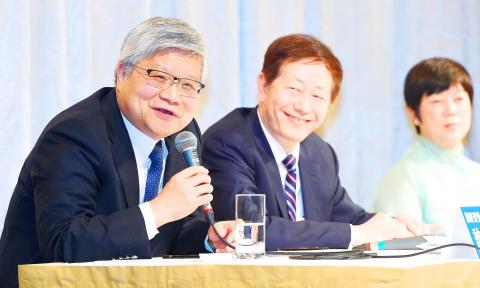Contract chipmaker Taiwan Semiconductor Manufacturing Co (TSMC, 台積電) yesterday trimmed its revenue growth forecast for this year to about 10 percent, citing a downward trend in high-end smartphone demand and volatile cryptocurrency mining activities.
The Hsinchu-based company in January estimated that revenue would rise by between 10 and 15 percent this year and said it aims for annual growth of 5 to 10 percent through 2010.
“China’s market is starting to pick up slowly in the smartphone segment, but high-end smartphone demand is still soft,” TSMC cochief executive officer C.C. Wei (魏哲家) said at an investors’ conference in Taipei.

Photo: Liao Chen-huei, Taipei Times
However, dwindling demand for premium smartphones would not derail TSMC’s growth plan for its 7-nanometer (nm) technology, Wei said, adding that it is the most advanced chip manufacturing technology available.
About 50 customers have approached the company looking to source 7nm chips, TSMC said.
Revenue from 7nm chips would make up 10 percent of its total revenue this year, largely matching the company projection from three months ago, Wei said.
Uncertainties in cryptocurrency mining demand, which largely hinges on the ups and downs of virtual currency prices, is likely to dampen growth momentum in that area, TSMC said.
The company said the slowdown in high-end smartphone sales would dent its revenue this quarter, as mobile phone components/chips contribute to 55 percent of its revenue.
“TSMC’s revenue in the second quarter is expected to be affected by continuing soft demand for smartphones. This decline will be partially [offset] by high-performing computing [chips],” Wei said.
Revenue should shrink by about 6.6 to 7.8 percent this quarter to between US$7.8 billion and US$7.9 billion, from US$8.46 billion last quarter, TSMC said.
Gross margin should drop to between 47 and 49 percent this quarter, from 50.3 percent last quarter, the company said.
Net profit contracted 9.6 percent quarterly to NT$89.79 billion (US$3.06 billion) from NT$99.29 billion last quarter, but on an annual basis, net profit rose 2.5 percent from NT$87.63 billion, TSMC said.
The company yesterday raised capital spending for this year to between US$11.5 billion and US$12 billion, up from US$10.5 billion to US$11 billion budgeted in January.
The increased budget would be used to expand mask-making capacity to cope with rising customer demand and on a prepayment for next-generation EUV tools, which are crucial if the company wants to continue shrinking transistors cost-effectively, TSMC said.
The firm said it plans to use the EUV equipment to make enhanced versions of its 7nm chips in the second half of next year and to make 5nm chips in 2020.
The company expects its capital expenditure to remain at a high level of between US$10 billion and US$12 billion over next few years.

GROWING OWINGS: While Luxembourg and China swapped the top three spots, the US continued to be the largest exposure for Taiwan for the 41st consecutive quarter The US remained the largest debtor nation to Taiwan’s banking sector for the 41st consecutive quarter at the end of September, after local banks’ exposure to the US market rose more than 2 percent from three months earlier, the central bank said. Exposure to the US increased to US$198.896 billion, up US$4.026 billion, or 2.07 percent, from US$194.87 billion in the previous quarter, data released by the central bank showed on Friday. Of the increase, about US$1.4 billion came from banks’ investments in securitized products and interbank loans in the US, while another US$2.6 billion stemmed from trust assets, including mutual funds,

AI TALENT: No financial details were released about the deal, in which top Groq executives, including its CEO, would join Nvidia to help advance the technology Nvidia Corp has agreed to a licensing deal with artificial intelligence (AI) start-up Groq, furthering its investments in companies connected to the AI boom and gaining the right to add a new type of technology to its products. The world’s largest publicly traded company has paid for the right to use Groq’s technology and is to integrate its chip design into future products. Some of the start-up’s executives are leaving to join Nvidia to help with that effort, the companies said. Groq would continue as an independent company with a new chief executive, it said on Wednesday in a post on its Web

JOINT EFFORTS: MediaTek would partner with Denso to develop custom chips to support the car-part specialist company’s driver-assist systems in an expanding market MediaTek Inc (聯發科), the world’s largest mobile phone chip designer, yesterday said it is working closely with Japan’s Denso Corp to build a custom automotive system-on-chip (SoC) solution tailored for advanced driver-assistance systems and cockpit systems, adding another customer to its new application-specific IC (ASIC) business. This effort merges Denso’s automotive-grade safety expertise and deep vehicle integration with MediaTek’s technologies cultivated through the development of Media- Tek’s Dimensity AX, leveraging efficient, high-performance SoCs and artificial intelligence (AI) capabilities to offer a scalable, production-ready platform for next-generation driver assistance, the company said in a statement yesterday. “Through this collaboration, we are bringing two

Even as the US is embarked on a bitter rivalry with China over the deployment of artificial intelligence (AI), Chinese technology is quietly making inroads into the US market. Despite considerable geopolitical tensions, Chinese open-source AI models are winning over a growing number of programmers and companies in the US. These are different from the closed generative AI models that have become household names — ChatGPT-maker OpenAI or Google’s Gemini — whose inner workings are fiercely protected. In contrast, “open” models offered by many Chinese rivals, from Alibaba (阿里巴巴) to DeepSeek (深度求索), allow programmers to customize parts of the software to suit their